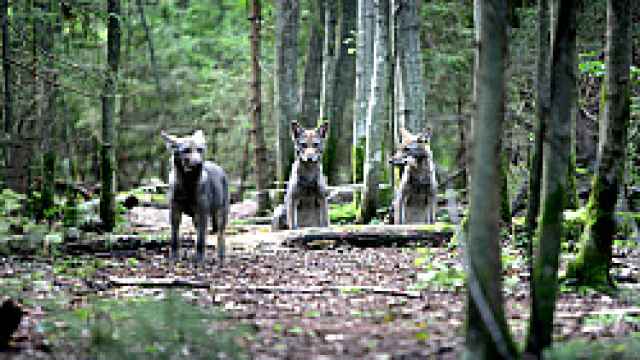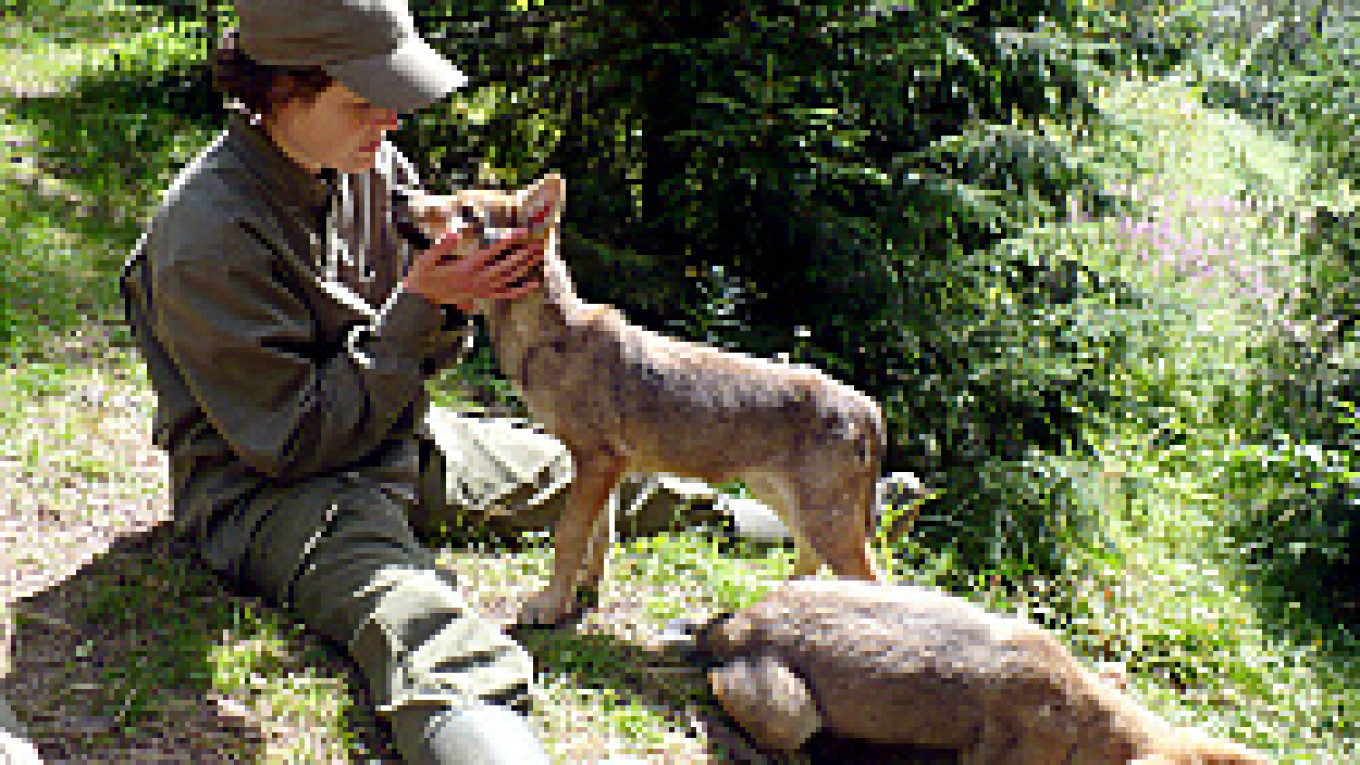Sitting in the kitchen of his house in a small village 500 kilometers northwest of Moscow, he explains how to howl properly. You need to think of something sad, Bologov said.
"The feeling of being wet, hungry, with nowhere to go and no one to sleep with," he said. "The stars must align."
By the time the wolves spoke to him, Bologov, 42, already had years of experience following, tracking and hearing wolves in the forest of the Tver region with his father, also a wildlife biologist.
Bologov and his family live in Chisty Les, a village in an isolated part of the Central National Park. The village is a biological station set up by the former director of the park, Valentin Pazhetnov, who has worked to rehabilitate bear cubs, orphaned or abandoned by their mothers, for more than 10 years. Specialists from around the world came to the village in May for a conference on reintroducing bears into the wilderness.
Bologov has followed in Pazhetnov's footsteps but with a different carnivore. He takes in orphaned wolf cubs, more than 30 of which have been rehabilitated in the last decade. Each day Bologov visits the forests where he has two sets of wolf cubs, a group of four and a group of seven who rely on him for their food. The cubs are fed within a protected area, where they can learn the basics of wolf life without fear of being attacked or having to hunt or scavenge for food.
Eventually, they head off into the forests by themselves.
"The work is done on enthusiasm alone," said Bologov, because feeding the wolves and keeping the project running requires about $100 per day.
Driving along muddy tracks to where seven of the wolves live, Bologov talks nonstop about ideas to help his wolves, from regenerating abandoned villages in the area to the film editing suite that has been set up in one house nearby. NTV will run a series of films in September cut from the thousands of hours of footage he has made over the years.
As Bologov's SUV turns a corner, Laetitia Becker, 24, a biologist from Strasbourg, France, emerges from the forest with a blur of fur scrambling at her feet, running around, fighting and biting. Seven wolf cubs greet him and continue playing in the small clearing in the woods.
The image does not fit with the wolves that haunt Russian fairy tales, gobbling up innocent grandmothers and preying on the herds of good country folk. As in many European fairy tales, the wolf is the ideal enemy, coming out of the forest to pick off whomever he chooses.
 Vladimir Filonov / MT Vladimir Bologov, 42, donning a T-shirt with his favorite animal -- the wolf. | |
"Comrade Wolf knows whom to eat, he eats without listening, and he's clearly not going to listen to anyone," Putin said last year.
In Soviet times, hunters killed up to 50,000 wolves per year. Now, permission to shoot 15,000 wolves is granted each year.
A passionate defender of the wolf, which grows up to 1 1/2 meters long and can travel up to 95 kilometers per night, Bologov contends that it is not a particularly dangerous animal.
"There is no need to say the wolf is special or any different from the fox," said Bologov, claiming they are far worse for stealing livestock. "The fox is also a carrier of rabies -- with wolves it is a rarity."
Bologov recently lost his chickens and cat -- not to a wolf, but to a wildcat.
People who live near wolves are not scared, Bologov said. "Children walk to school, people collect mushrooms, nobody is scared that a wolf will eat them ... the reaction comes from people where there aren't any wild animals."
"There are 40,000 to 45,000 wolves," he said, "but we have 200,000 bears in Russia and nobody says we have too many bears."
One of Bologov's studies attempts to track wolves and show that they often visit villages without doing any harm and that attacks on domestic animals are rare.
Wolves do not attack people that often today. In the 1940s, however, attacks were more common. One explanation is that the wolves developed a taste for human flesh because of the huge number of bodies that lay in the devastated countryside following the war.
 Vladimir Filonov / MT Three of Bologov's wolf cubs anxiously eyeing the student entering their enclosure, who has come to feed them. | |
She has been observing the cubs for months. Every day she heads up to the cabin in the forest. As part of one study, she keeps notes of their every move. In another part, she follows a different cub with a GPS transmitter and then uploads the data onto a computer back at her cottage outside the forest.
She rotates surveillance of the seven cubs each day and has named each one after the day on which she follows it. She chose Spanish names of the day, she said, and giggles when talking about miercoles, or Wednesday, but is serious when she says the name is for scientific reasons and that she never calls them that out loud.
"It's not my dog," she said, "and in the future, it is better if they are not used to the human voice." With wolf hunting still a national tradition, fear of the human voice is necessary.
The cubs are part of a scientific experiment with set rules, but she admits that developing an attachment is inevitable. Her previous set of wolves went into the wild unexpectedly last year.
"It was hard. I did not think that it would happen," she said. "I would prefer to have been ready for it emotionally ... but in general, if they are alive somewhere, I am very happy as it is the goal for the project. I don't want to keep them."
Wolves are social and intelligent animals and ideal subjects for animal behaviorists. "They live in a group, they play in a group and they interact. The interaction is very interesting as they are communicating, smelling and playing with each other," said Becker.
Bologov's other group of wolves is being watched by Andrei Polyarnov, a behavioral scientist from the Moscow Ecology Institute who lives in an abandoned village near the 1 1/2-hectare enclosure where four cubs live. He and his students study the group of four, recording wolf howls and whimpers and studying how the animals interact.
Other volunteers also help by paying to stay and assisting at Chisty Les. Walter Heijder, a biology teacher from Holland, bore the bites of a night in the forest waiting for wolves. But the bites were from mosquitoes -- not wolves -- as it had been a fruitless night waiting for wolves to come.
Bologov was wondering where to put his latest charge. The day before, some hunters had called to tell him they had found a wolf cub in the neighboring region. Either take it, or we will kill it, the hunters told him. He instantly agreed and began to wonder where he would get the $100 or $200 the hunters would demand for the cub.
A Message from The Moscow Times:
Dear readers,
We are facing unprecedented challenges. Russia's Prosecutor General's Office has designated The Moscow Times as an "undesirable" organization, criminalizing our work and putting our staff at risk of prosecution. This follows our earlier unjust labeling as a "foreign agent."
These actions are direct attempts to silence independent journalism in Russia. The authorities claim our work "discredits the decisions of the Russian leadership." We see things differently: we strive to provide accurate, unbiased reporting on Russia.
We, the journalists of The Moscow Times, refuse to be silenced. But to continue our work, we need your help.
Your support, no matter how small, makes a world of difference. If you can, please support us monthly starting from just $2. It's quick to set up, and every contribution makes a significant impact.
By supporting The Moscow Times, you're defending open, independent journalism in the face of repression. Thank you for standing with us.
Remind me later.


